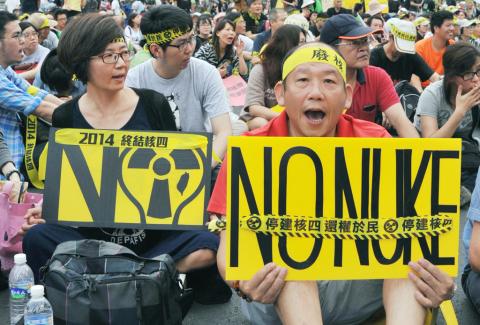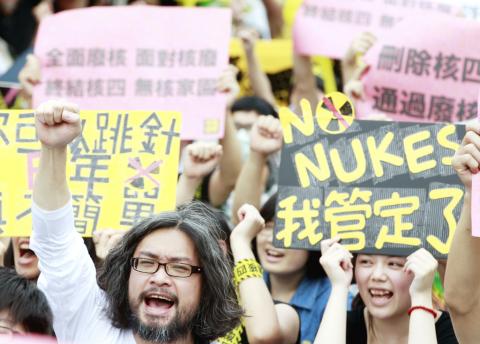Tens of thousands took to the streets of Taipei yesterday afternoon in an antinuclear protest that also occupied a section of Zhongxiao W Road in front of Taipei Railway Station.
At 3pm, Ketagalan Boulevard was packed with protesters wearing yellow ribbons that read: “Stop the Fourth Nuclear Power Plant. Give Power Back to the People,” as they listened to speeches and prepared to march.
Green Citizens’ Action Alliance chairperson Lai Wei-chieh (賴偉傑) said the government had threatened the public with increased electricity bills and weakening competitiveness if the nation gives up nuclear power, but he said that Germany — an example cited by the government — uses a different electricity price calculation model, has strong global competitiveness and has the most sustainable energy sector in the world.

Photo: Mandy Cheng, AFP
Taiwan Power Co’s (Taipower, 台電) data showed 197 components of the plant’s No. 2 reactor have been removed and installed into the No. 1 reactor, Lai said, adding that he did not trust the safety inspections being carried out by Taipower and the designer, General Electric Co.
“How can we feel safe about the plant?” Lai asked.
“We live in a beautiful country where you can reach the sea and the mountains in the same day, so why destroy such a beautiful place?” film director and frequent participant in antinuclear demonstrations Ko I-chen (柯一正) said. “If you [the government] cannot deal with nuclear waste, you should not create more.”

Photo: Pichi Chuang, Reuters
Former Democratic Progressive Party chairman Lin I-hsiung (林義雄), who is on hunger strike, represents the will of millions of Taiwanese, Ko said, adding that it is shameful that President Ma Ying-jeou’s (馬英九) administarion has treated him like “a child asking for candies.”
Green Citizens’ Action Alliance secretary-general Tsuei Su-hsin (崔愫欣) read out the protesters’ “non-cooperation movement” statement.
“We have two demands — stop construction of the Fourth Nuclear Power Plant, retire the operating plants as soon as possible and amend the ‘bird-cage’ Referendum Act (公民投票法),” Tsuei said. “Yet officials in power still neglect our demands, stall and shirk their responsibilities with excuses.”

Photo: Fang Pin-chao, Taipei Times
Holding signs reading: “I am a mother and against nuclear power,” several women said they formed a mothers’ group on Facebook when they saw students being injured by police officers during the forced eviction of protesters from the Executive Yuan last month.
“We treat all Taiwanese children as our children. How can we cower away and not protect them?” Sung Ya-chuan (宋雅娟) said.
Within an hour, the parade reached Zhongxiao W Road, where many protesters removed the center road blocks so that they could occupy both sides of the road and paralyze the traffic, triggering police to declare the protest illegal.
However, with protesters continuing to pack both sides of the road, riot police departed shortly afterwards, with the crowds applauding and cheering their departure.
Organizers sounded a simulated nuclear emergency warning siren and asked protesters to lay on the ground, mimicking the scene of a real nuclear disaster.
A woman surnamed Wang (王) from Greater Taichung said she first attended an antinuclear protest as a child in 2000 with her mother, and that now, as an adult, she wanted to protest because there is no safe way of dealing with nuclear waste.
A woman surnamed Wu (吳), a mother accompanied by her baby in a stroller, three-year-old son and husband, said they attended the parade because she cannot endure the government’s continued threats and its unwillingness to develop alternative energy sources. She said that the dangerous plants and nuclear waste should not be left for the next generation to deal with.
The organizers said those occupying Zhongxiao W Road plan to continue until at least tomorrow.
According to police estimates, more than 28,000 people took part in the rally, while the organizers said about 50,000 participated.
Meanwhile, in response to the Chinese Nationalist Party’s (KMT) announcement that it has agreed to halt construction of the Fourth Nuclear Power Plant’s No. 1 reactor and that No. 2 reactor would be “suspended,” antinuclear groups said that while they acknowleged the KMT’s decision, they do not accept it because the policy had not been announced by the Executive Yuan, but by the party.
“The announcement showed that the government cannot tell the difference between the KMT and the nation’s government,” Citizen of the Earth Taiwan’s Taipei Office director Tsai Chung-yueh (蔡中岳) said.
Separately, Chen Shang-chih (陳尚志), a National Chung Cheng University professor who is serving as Lin’s spokesperson during his hunger strike, also said Lin “would not respond to the decision of a political party.”
“It was a KMT meeting today. Why should we respond to a party? Mr Lin will not respond until the Executive Yuan orders constitutional action or the Legislative Yuan reaches a resolution,” Chen said.
Chen said Lin would continue his hunger strike.
Additional reporting by Chris Wang

SECURITY: As China is ‘reshaping’ Hong Kong’s population, Taiwan must raise the eligibility threshold for applications from Hong Kongers, Chiu Chui-cheng said When Hong Kong and Macau citizens apply for residency in Taiwan, it would be under a new category that includes a “national security observation period,” Mainland Affairs Council (MAC) Minister Chiu Chui-cheng (邱垂正) said yesterday. President William Lai (賴清德) on March 13 announced 17 strategies to counter China’s aggression toward Taiwan, including incorporating national security considerations into the review process for residency applications from Hong Kong and Macau citizens. The situation in Hong Kong is constantly changing, Chiu said to media yesterday on the sidelines of the Taipei Technology Run hosted by the Taipei Neihu Technology Park Development Association. With

CARROT AND STICK: While unrelenting in its military threats, China attracted nearly 40,000 Taiwanese to over 400 business events last year Nearly 40,000 Taiwanese last year joined industry events in China, such as conferences and trade fairs, supported by the Chinese government, a study showed yesterday, as Beijing ramps up a charm offensive toward Taipei alongside military pressure. China has long taken a carrot-and-stick approach to Taiwan, threatening it with the prospect of military action while reaching out to those it believes are amenable to Beijing’s point of view. Taiwanese security officials are wary of what they see as Beijing’s influence campaigns to sway public opinion after Taipei and Beijing gradually resumed travel links halted by the COVID-19 pandemic, but the scale of

A US Marine Corps regiment equipped with Naval Strike Missiles (NSM) is set to participate in the upcoming Balikatan 25 exercise in the Luzon Strait, marking the system’s first-ever deployment in the Philippines. US and Philippine officials have separately confirmed that the Navy Marine Expeditionary Ship Interdiction System (NMESIS) — the mobile launch platform for the Naval Strike Missile — would take part in the joint exercise. The missiles are being deployed to “a strategic first island chain chokepoint” in the waters between Taiwan proper and the Philippines, US-based Naval News reported. “The Luzon Strait and Bashi Channel represent a critical access

Pope Francis is be laid to rest on Saturday after lying in state for three days in St Peter’s Basilica, where the faithful are expected to flock to pay their respects to history’s first Latin American pontiff. The cardinals met yesterday in the Vatican’s synod hall to chart the next steps before a conclave begins to choose Francis’ successor, as condolences poured in from around the world. According to current norms, the conclave must begin between May 5 and 10. The cardinals set the funeral for Saturday at 10am in St Peter’s Square, to be celebrated by the dean of the College